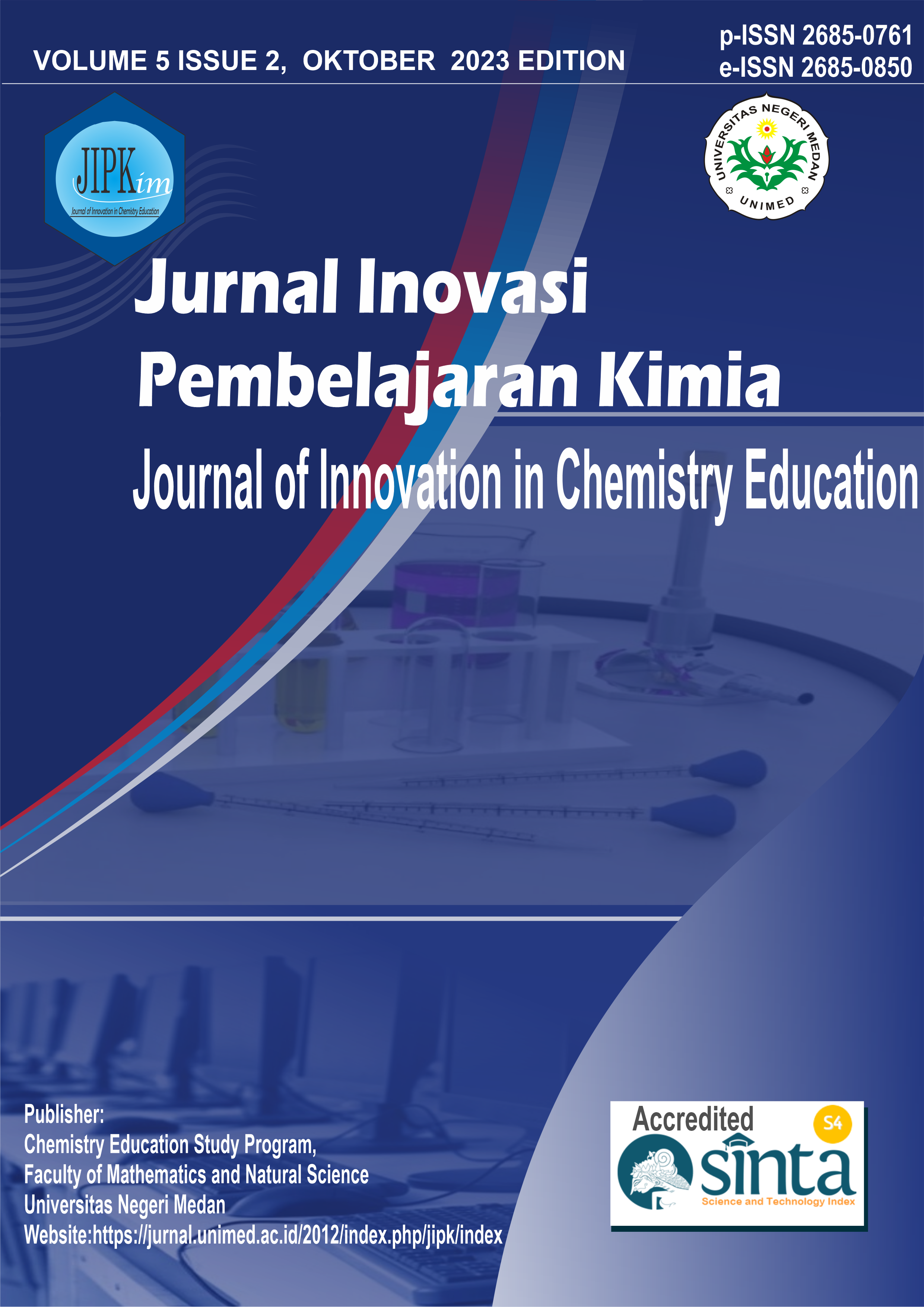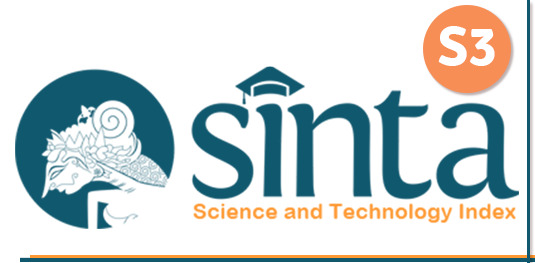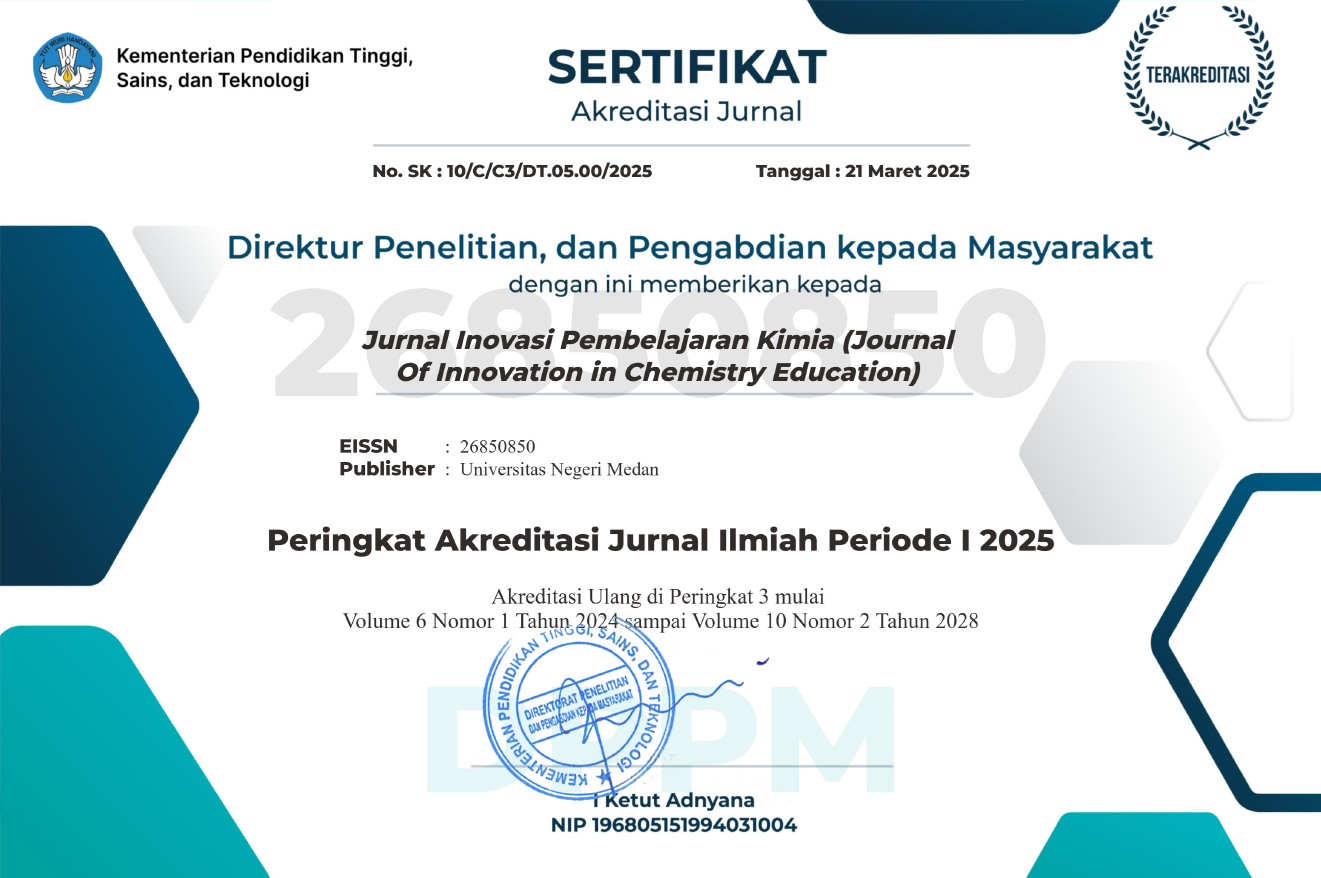Influence of STEM Student Worksheets to Improve Learning Outcomes and Student interest in Reaction Rate
DOI:
https://doi.org/10.24114/jipk.v5i2.56228Abstract
This study aims to determine the effect of LKPD STEM using Problem Based Learning (PBL) model on reaction rate material. This research was conducted at SMAN 8 Medan in the 2022/2023 school year. This type of research is a quasi experiment with pretest posttest control group design. The population in this study were all XI MIPA classes at SMAN 8 Medan. The research sample was XI MIPA 4 class as an experimental class taught with STEM LKPD using Problem Based Learning (PBL) model and XI MIPA 1 class as a control taught using Problem Based Learning (PBL) model without STEM LKPD. The instruments used in this study were 20 multiple choice questions that had been tested for validity, reliability, difficulty level and differentiation, and 25 items of questionnaire statements of learning interest. The results of this study indicate that there is an effect of STEM LKPD using the Problem Based Learning (PBL) model on learning outcomes with hypothesis testing sig. 0,001 < α (0,05). In addition, there is an effect of STEM LKPD using the Problem Based Learning (PBL) model on learning interest with a hypothesis test sig. 0,000 < α (0,05).References
Adelitai, T., Suheri, T., & Ibrahim, A. (2017). Development of Learning Strategies Using a STEM“Problem Based Learning Approach on Reaction Rate Material in Class XI High School. Journal of Chemical Education Research, 105- 110.
Amdayani, S., Dalimunthe, M., & Nasution, H. A. (2022). The Influence of the STEM-Based Thermochemistry Module on Learning Outcomes and Student Motivation in the Capita Selecta Chemistry Course. School Education Journal, 95-96.
Artiani, Leni. (2020). Developing Student Worksheets (LKPD) Using a Picture-Based Science, Technology, Engineering, and Mathematics (STEM) Approach. Lampung: Raden Intan State University.
Dalimunthe, M., Amdayani, S., Syafriani, D., & Haqqi Annazili N, H. (2022). Development of Electronic Module on Colligative Materials STEM Based Solutions (Science, Technology,Engineering,Mathematis) Using Kvisoft Flipbook Maker Application. International Conference on Innovation in Education, Science and Culture, 1-6.
Fitriyah, Lina Arifah., & Humaidillah Kurniadi Wardana. (2019). Student Worksheets (LKPD) Elements, Compounds and Mixtures with a STEM Approach. Zarah Journal, 2 (2), 86-92.
Herita, M. S. (2022 ). Application of the Discovery Learning Learning Model in Reaction Rate Material to Improve Student Learning Outcomes. Journal of Educational Performance, 109-129.
Hidayat, T., & Andromeda. ( 2019 ). Effectiveness of Using the Reaction Rate Module Based on Guided Inquiry and Integrated Experiments to Improve Student Learning Outcomes. Journal of RESIDUES, 69-76
Latifah , F., & Hanik, E. U. ( 2023 ). Application of the Problem Based Learning Model Using a STEM Approach to Improve Problem Solving Skills of Class IV Students in Science Subjects MI An-Nur Daren. Educational Window Journal , 171-179.
Mardhiyah, R. H., Aldriani, S. N., & F. C. (2021). The Importance of Learning Skills in the 21st Century as a Demand for Human Resource Development. Journal of Education, 29-40.
Mellyzar, A. M. (2020). Improving Learning Outcomes Using Project Models. Chemistry in Education, 1-5.
Safitri, R., Haryanto, & Harizon. (2021). The Development Of PBL-STEM-Based E-LKPD To Improve Students' Science Literacy Skills On Reaction Rate Materials. Journal of Chemical Education , 113 - 129.
Sandabunga, S., Anwar, M., & Alimin. (2021). The Influence of the Problem Based Learning Model on the Learning Outcomes of Class XI MIA SMAN 2 Makassar Students (Study on the Main Material of Reaction Rates). Chemical Journal, 91-98.
Saragi, L., & Dalimunthe, M. (2022). The influence of the problem based learning model using PowerPoint on students' learning outcomes and interest in reaction rate material in class XI SMA. Educational Scientific Journal, 353-361.
Sihombing, R. K., Sihombing, J. L., & Amdayani, S. (n.d.). Developing Student Worksheets (LKPD) Based on STEM (Science, Technology, Engineering, and Mathematics) on Reaction Rate Material. UNIMED FIP PGSD School Journal, 26-31 .
Suswati, U. (2021). Application of Problem Based Learning (PBL) Improves Chemistry Learning Outcomes. Journal of Teacher Innovation and Educational Sciences, 127-136.
Tambunan, C. E., Simanjuntak, N. Z., & Susanti, N. (2021). Website Development Based on Problem Based Learning as an Online Learning Media on Reaction Rate Material. Journal Of Chemistry Learning Innovation, 35-45.













